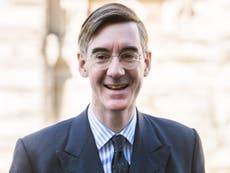How cosying up to Trump has left Britain’s leaders eating their words
The UK rolled out the red carpet for the US president – and Brexit-backing MPs lined up to praise him over the course of his term. Sean O'Grady considers their poor judgement


It seems a lost world now, but for right-wing Britons back in 2016 Donald Trump was the coolest guy around to be photographed with. His shock – in more ways than one – victory prompted frenetic predictions about a new age of nationalist populism. Trump’s victory in November did, after all, follow the equally anti-establishment revolt in the Brexit referendum five months before.
In due course, Trump would claim that he predicted Brexit. Rightist politicians and commentators basked in a warm glow of mutual congratulation. Nigel Farage turned up at Trump’s rallies. Michael Gove rushed to New York to interview Donald Trump for The Times, with Rupert Murdoch in the room. He had the obligatory thumbs-up picture taken against a backdrop of framed magazine covers, some real, some fantasies, Gove beaming as though he couldn’t believe his luck.
Farage and the rest of the “bad boys of Brexit” had their grinning mugs parked next to Trump’s in the gaudy gilded surroundings of Trump Tower. Farage must have been smiling from ear to ear when Trump publicly asked Theresa May to make him the UK’s ambassador to Washington. It’s fair to say, to borrow a phrase once deployed by Farage, they’re not laughing now.
Et tu, Boris? Where once the president generously called him “Britain Trump” (sic) and praised him as “tough” and “smart”, now Boris Johnson condemns the violence Trump inspired, and, albeit with some hesitation, endorses Joe Biden’s victory. ’Twas not always thus. At a private dinner in 2018, Johnson, then foreign secretary under Theresa May, admitted he was “increasingly admiring of Trump”, finding “method in his madness”. He publicly suggested Donald Trump be awarded the Nobel Peace Prize, albeit rather contingently – “if Trump can fix North Korea and the Iran nuclear deal then I don’t see why he’s any less of a candidate than Barack Obama”.
Of course, Johnson probably didn’t believe it, but it was all part of a desperate attempt to butter up the president with a view to an early US-UK trade deal. Hence also the near state visit afforded to Trump and his family. Of course, Her Majesty is obliged to help her ministers, but Buckingham Palace and the Labour opposition were thought to consider the honour premature.
Nonetheless, the trip went ahead, but Theresa May virtually begged Trump for a trade treaty, and her sentiments about the transatlantic relationship haven’t aged well: “It has been fundamental to the protection and projection of our interests and values for generations. With US leadership at its foundation, it’s beating heart remains our democratic values and our commitment to justice.”
For his part, Trump veered between criticising her for ignoring his negotiating advice and reportedly saying she was like a “bossy schoolteacher who bored him”; and calling her “a very nice lady”. The Donald considered Elizabeth II “a fantastic person”; her views on him are unknown.
Other reports suggest Trump tried to bully May and called her “foolish”. Her advice to him to ignore the press was obviously in vain.
Trump was the great orange hope of the Brexiteers. Ignoring Trump’s hardline protectionist policies, they seemed to think sentiment, the “special relationship” and a bust of Winston Churchill in the Oval Office would do the trick. Jacob Rees-Mogg gushed: “It is our national good fortune that the president with whom we will develop this special relationship is Mr Trump.”
In 2016 he said he would “almost certainly” vote for Trump if he could; his preferences now are less public. Similarly for Liam Fox, the former international trade secretary. He has spent much of his career cultivating conservative contacts in Washington and hoped perhaps for much from Trump. Now he is left to tweet thanks to Mike Pence for restraining Trump and saving the US constitution.
The duty of every British government (and monarch) is to make friends with the Americans, for obvious reasons. There is no need to insult the president, or interfere in one another’s national polls (something Barack Obama did in the Brexit referendum with that line about the back if the queue). Diplomacy has its place. But the scale of the investment made by two Conservative premiers in the presidency of Donald Trump was remarkable and, as it turned out, unwise. There was no trade deal, and few other favours, though Trump took an uncharacteristically hard line with Vladimir Putin after the Salisbury poisonings.
Apart from anything else, figures such as Farage, Johnson and May behaved as though Trump would be in power forever. As it happens Trump did his level best to live up to that hope, but, alas, he lost. Now the British are faced with a veritable state banquet of words to eat.



Join our commenting forum
Join thought-provoking conversations, follow other Independent readers and see their replies
Comments